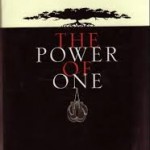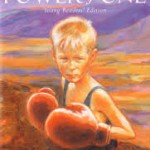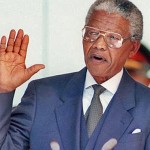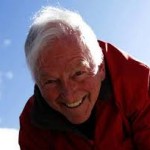Sometime during the weeks following Nelson Mandela’s death, I started thinking of The Power of One, a novel that had meant a lot to me in the early ‘90s. (In a fit of bad poetry, I once wrote, “The loneliness birds are croaking…” and feared and heard them often that decade. I still do, sometimes, though I now remember that those birds were inspired, if not stolen, from the novel’s narrator.) Among the many articles and tributes that I read to Madiba, there were references to his enjoyment of boxing as a young man, and the things that he had learned from it. Right! And The Power of One is set in South Africa, centred on the boxing obsession and exploits of a white boy, and wait, wasn’t there a black man in prison who inspired his fists and his mind? I went looking, and found a free on-line torrent (okay, my wife did), but I didn’t really get into this second reading until I was holding a paperback copy. I could say it was an unconscious desire to respect author’s rights, but it was mainly a bibliophile’s bias. I like the feel of 500 pages between my fingers.
The Power of One was a first novel by Bryce Courtenay, an Australian advertising executive who wrote the book as a mid-life challenge¹, setting his adventurous and spiritual and polemical – and, I wasn’t surprised to discover, highly autobiographical – story in his native South Africa. This rambling tale, which he’d planned as a “practice novel”, sold millions. I liked it. No. I gobbled it like a crazed and starving thing when I was 35, possibly during the long nights when I was living alone across town from a bleeding home. (Harris Street. My upstairs room had Mrs. Johnston’s nicknacks everywhere. I can still see the shaggy brown ‘70s carpet. Some of me never left that couch.) Now maybe I’m writing fiction, but the novel’s message – a fairly trite one, actually – about the indomitability of the human spirit and redemption-after-suffering really spoke to a divorcing Dad. Heck, the central character, Peekay – we are never told his given or family names – is an abandoned boy of five at the beginning, and we follow him through the crises and victories of his frankly incredible life until he reaches manhood with a bang, a near-death, a windfall and dozens of well-thrown punches. Listen, I used to be a little boy, and I had three growing sons of my own, and in hindsight, none of us were very good fighters. Peekay had powers of mind and fist, and ag, man, a series of astoundingly useful mentors and friends, on his way to discovering and using The Power.
¹ Courtenay’s personal story is either inspiring to a mid-life writer (I’m working at it) or bloody irritating (right this moment, I’d say, yeah): he gets back to a dream long buried by his hard-driving success in the ad biz; he quits his job, quits drinking and smoking, and writes The Power in a year; he runs 40 marathons and writes over 20 more books in less than 25 years, and dies happy in 2012. Jerk.
The novel has everything: ethnic antagonism, racial hatred, private-school bullying, the
shadow of World War 2, the “toughest damn chicken in the world”, prison smuggling, a German pianist, witch doctors and Christian fundamentalism, heavy-handed symbolism, lyrical descriptions of the South African countryside, at least one Jewish angel, two Afrikaner devils, a mysterious cave, varieties of unconsummated love, the lonely romance of train travel, bed-wetting, bet-settling, residential schools, apartheid, boys switched (nearly) at birth, township jive, Beethoven, rugby, Rasputin, racism, social justice and schoolboy adventure, fistfights and madness and scams, oh my! On re-reading, it’s clear that Courtenay was burning with both long-stoppered creative ambition and furious memories that had to be in there. So, yes: he was an English kid raised mainly among Afrikaners in the resentful aftermath of the Boer War; he was bullied, but found a path of childhood safety (fascinatingly, it was not boxing, but story-telling that kept fists away); he was bright and lonely and driven; there really was a Miss Bornstein, and a Barberton, and a rose-growing grandfather; and, that rather tacked-on episode in the mines of Rhodesia was also told largely from experience.
And yes, many of the inventions do seem entirely too coincidental. Multiple deuses emerge from several machinas. The first-person narration from Peekay, looking back from adulthood, has a sometimes bizarrely accurate and understanding tone, and other times lapses into a coy childish ignorance. The stars do whirl and re-align themselves to better serve the narrative needs of Peekay’s story, and put him in positions of unlikely importance – as the chess-playing, horticulturally precocious, multi-lingual musician/boxing champion/academic boy wonder/social justice activist/miner/talisman/blue-eyed prophet of the South African century. The dialogue, especially when Peekay is a child, is wooden and almost laughably expository at times. Almost. But.

Peekay lives. Mr. Courtenay, however, died in 2012, to great public praise and sorrow in his adopted homeland, Australia.
There are many buts. The Power of One still moved me, all these many years later, with its unabashed advocacy for goodness. It is hopeful, and though Peekay’s life is hugely improbable, it is also full of pain, self-doubt, and existential crisis. Sometimes too perfectly, but (sue me) with a welcome whiff of unending possibility, the kid finds a way to win. I like winning. Courtenay’s novel is many things, among them a (mainly) fictional embodiment of the second and fourth verses of William Ernest Henley’s 19th-century hymn to stubborn individualism, “Invictus”:
…In the fell clutch of circumstance
I have not winced nor cried aloud.
Under the bludgeonings of chance
My head is bloody, but unbowed….
It matters not how strait the gate,
How charged with punishments the scroll,
I am the master of my fate:
I am the captain of my soul.
Nelson Mandela doesn’t have anything to do with this novel. The black boxing coach, Geel Piet, is an interesting minor character but there’s no suggestion of him being anything other than a prison entrepreneur/survivor who happens to be a gifted boxing coach. (Hmm: shades of Morgan Freeman in The Shawshank Redemption, except for the boxing part, and the South African apartheid.) However, maybe “Invictus” was to blame, and where Mandela came to my haphazard mind, in the way that the movies and other fictions often compel us to reorganize our histories around them. The Power of One was such a hit that a mediocre movie had to be made about it, tout de suite! (It came out in 1992.) There is “Doc”, the eccentric German exile with his music and his cacti – hey, is Armin Mueller-Stahl busy? This is a movie that will cost millions to make (spoiler alert: it lost money, ag man, big-time), so there’s gotta be a girl, wholly absent in Courtenay’s orginal. There was a black prisoner who taught Peekay to box – and, of course, to LIVE – “first with the head, and then with the heart”. (Okay, in the novel, it’s a kind Afrikaner boxer, Hoppie, who first instils this mantra and the dream of being a fighter in Peekay. But anyway. Details.) Get me Morgan Freeman! (The Three Degrees of Morgan: Freeman also plays Mandela in the later Matt Damon film on South African rugby, titled Invictus after Henley’s poem.) Somehow, then, I wasn’t surprised to see that TPo1 was directed by John G. Avildsen, director of Rocky (and one of its illegitimate children) and The Karate Kid. If Courtenay’s novel is marred by story-telling clichés, the movie gets it worse, if Wikipedia is to be believed.
Should you read The Power of One? You have to be willing to turn pages — there are lots of them, most of which turn readily, while others are full of perhaps too much mysticism or South African topography for some readers. You cannot be a committed fan of irony and jaded views of the anonymity and pointlessness of modern life, or at least you’d have to be willing and able to suspend most of that toxic commitment to cool disbelief. You do not, I think, need to appreciate the likes of Dan Brown – Courtenay’s a lot better writer than that, and particularly in his physical descriptions of place and his spinning of philosophical reflections, there are many passages of real beauty; they made me glad, frequently, that I’m not able to “skip the description”, as some alleged readers are alleged to do.

Our hero, whose adopted name takes a bullying humiliation and turns it into a distinctive identity. Starring, from the background, is the spirit of African beauty and hope.
Ironically, though, to enjoy The Power of One and get past its faults, you’ll have to counter Peekay’s approach to boxing and life: you’ll be best to lead first with the heart, and then with the head. Turn off your brain for a bit, if it’s a critical machine, and go back to the South Africa that Mandela grew up in, told as a young Englishman’s Adventureland. I’m glad to have visited it twice.



I have read a few ambling, slow starters back when I was given vacation time on the state. Books like W.O.Mitchell’s Who Has Seen The Wind and Peyton Place, by some other author adept at weaving sub-plots after a hundred or so pages of seemingly disconnected positioning of the over-arching plot. They were only about 400 or so pages long. I would never even start a fiction book that large today; not even if I received the book as a gift, printed on 22 carat gold-leaf pages that I could keep only if I finished the book.
I thought that this post was going to have more to do with Mandela, one of my favourite individuals ever since he told Brian Mulroney to clean up his own back yard before he tried to advise and support him in his attempts to deal with apartheid, but, alas. Disappointed again.
And then I read the quote from “Invictus”.
…In the fell clutch of circumstance
I have not winced nor cried aloud.
Under the bludgeonings of chance
My head is bloody, but unbowed….
It matters not how strait the gate,
How charged with punishments the scroll,
I am the master of my fate:
I am the captain of my soul.
I just wonder what other examples of individuals deserving of words like these have lived on this earth. Mandela has to be one.
So many people could take solace in these words if they could only identify with the unyielding strength with which they, too, carry themselves through their lives as is described in the first few lines. And that they, too, can make an omelette out of broken eggs, a living out of altered dreams, and a life by remaining true to their beliefs.